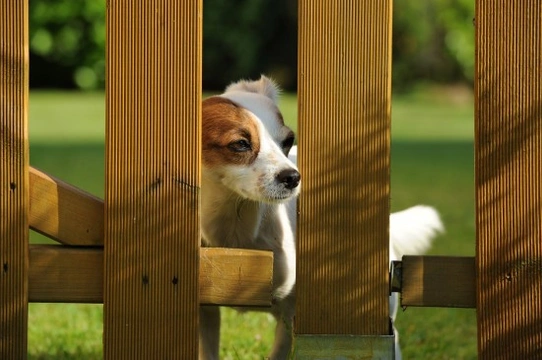
Dealing with a roaming dog
If your dog is apt to let themselves out of the garden and go wandering around the neighbourhood, pushes past you when you open the door and goes running off on their own or is apt to disappear when out on walks and not respond to your recall, you potentially have a real problem on your hands. Roaming dogs can be very problematic, placing themselves at risk for running into trouble or danger, and of course, potentially presenting a hazard to other people, pets and road users too.
Many owners of dogs who are apt to behave in this way despair of ever being able to manage their dog’s behaviour, but in many cases, roaming behaviour can be effectively managed and sometimes, even prevented. Read on to learn more about how to deal with a dog that is apt to roam.
Why are some dogs apt to roam?
The reasons behind why any given dog might have a propensity to wander off or go running off on their own can be complex and varied. One of the most common causes of roaming is un-neutered dogs and bitches, responding to their natural breeding instincts and going off in search of a mate.
Some very active dog breeds such as the Siberian Husky and the Border Collie need an awful lot of exercise every day, and if they do not get their needs met with enough outdoor time running around, they may have a propensity to deal with the issue in their own way!
Boredom is another reason for roaming, and if your dog does not receive enough mental stimulation and entertainment, and enough quality time with their owners, they might go off looking for something else to entertain themselves with! Stress, unhappiness and general anxiety can also lead to roaming behaviour too.
Why is roaming a problem?
It may seem obvious why an unsupervised dog out on the loose is a problem, but it is worth spelling it out anyway! An unsupervised dog is placing themselves at risk for many hazards, including theft, accidents, fights with other dogs, and of course, disappearing and not being able to find their way home.
Added to which, your dog on the loose may cause accidents of their own, roam onto other people’s property, alarm or potentially injure other people, and possibly, chase smaller animals such as cats.
Ways to deal with roaming behaviour
In order to deal with and curb roaming behaviour in your dog, first of all you need to get to the root of the problem and identify why your dog is roaming. Then, you can take steps to address the problem.
As a first line of defence before you get the problem under control, make it as hard as possible for your dog to run off in the first place. Try walking them on a retractable lead and only allowing them to run loose within enclosed spaces, not leaving them out in the garden unsupervised if you are not confident about your fencing, and closing your dog in another room when you answer the door.
If your dog is not neutered, consider having them neutered, as this will almost certainly reduce or eliminate their desire to wander off. If the problem is a general behavioural issue, however, you may have to go through a process of trial and error.
Firstly ensure that your dog is getting enough exercise, as lively active dogs will not be happy if their walks are inadequate. Roaming and running off can create something of a vicious circle, where the owner is too scared to walk the dog much, which exacerbates the problem. Make sure that you take your dog for plenty of walks and tire them out, and meet the needs of their age and breed in terms of how active their lifestyle is.
If your dog is bored, you will need to consider why this might be: are you spending enough time with them, actively doing things with them and keeping them entertained? When your dog is left alone, do they have plenty of things to do and play with, and are you sure that you are not leaving them alone for too long at a time? All of these factors can be an important part of keeping your dog responsive and close to home!
Conclusion
Finally, look again at your dog’s responsiveness to training commands, and consider going back to basics. If your dog will not respond to the recall command reliably, this is something that you will need to address, and revert to the very basic building blocks of good training, instilling the need for good recall and obedience in your dog. This may take some time to achieve, particularly in an adult dog that has never fully learnt and complied with recall 100% of the time, but it is vitally important in order to keep your dog close, and avoid problems.



